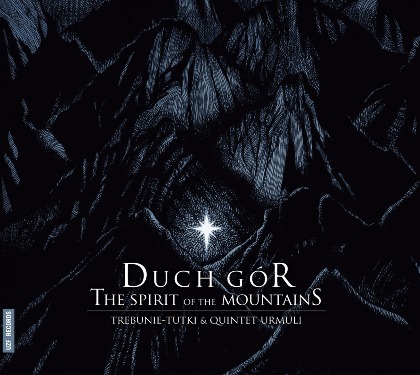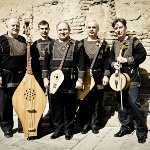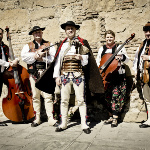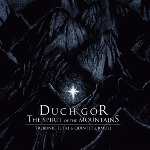
Songs
- country:Poland
- style(s):Folk, Polyphony
- label:Unzipped Fly Records & Management
- type:Band
- gender:male, female
- instrumentation:vocal, dance orchestra
- artist posted by:Unzipped Fly Records & Management
Line up
- ANDRZEJ POLAK ( violin, voice)
- ANNA TREBUNIA-WYROSTEK (voice, higlander’s cello, higlander’s voice glissa)
- DAVID RATIANI (voice, bass chonguri)
- GELA TABASHIDZE (voice, salamuri)
- JAN TREBUNIA-TUTKA (viola, voice)
- KRZYSZTOF TREBUNIA-TUTKA (voice, violin, higlander’s bagpipe, higlander’s fl)
- KUBA „BOBAS” WILK (double bass)
- NUGZAR KAVTARADZE (voice, phanduri, duduk)
- SHALVA ABRAMASHVILI (voice, chuniri)
- TAMAZ MAMALADZE (voice, bass phanduri, gudastviri (Georgian bagpipe)
Links
Highlanders living at different latitudes have many common characteristics: temperament, lifestyle, preferences, and their music is distinctly lively and swathed in a certain type of lyricism. Life in harsh mountain conditions and charmingly beautiful surroundings left a mark on their mentality and resulted in an original and recognisable musical style.
Highlanders from Podhale and Georgians from Kazbek have for centuries been free and independent shepherds, criminals, and valiant warriors, escaping any authority and led by an internal instinct and a sense of justice, pride and honour. Their music and strong male singing highlight these characteristics.
Trebunie Tutki were the first Polish band to start a dialogue with culturally and geographically diverse musical genres, including names such as the Jamaican star of roots reggae Twinkle Brothers and Adrian Sherwood. However, experimentation is not the essence of their work - their key goal is musical understanding beyond any divisions and prejudice. The most creative aspect of their work is the creation of New Highlander Music - pieces composed by Krzysztof Trebunia-Tutka and inspired by the tradition of highlanders from the Podhale region. That music lay the foundations for the idea of Polish world music, boldly disseminated in the world by the band, not attempting to imitate anything, but creating a new quality of Polish heritage.
The musicians are pursuing a desire to connect with the Georgian music and culture, so close to their hearts, if geographically distant. Familiar scales, polyphony, and even the nature and character of the dances of the two peoples create a platform for new musical discoveries, and the differences beautifully bring out their original characteristics.
The new project, based around traditional shepherd instruments and polyphonic songs is bound to chime with audiences anywhere in the world. The musicians will tell stories not just of their highland traditions, legends and values, but also topics close to anyone's heart: love and passion.
The performance aspect of the project - showcases of Polish and Georgian highlander dance in traditional dress - will be another strong attraction of the shows. Dance is an integral part of presentation of the vernacular culture of both nations, in a form almost unchanged for centuries, but in new contexts.
The Quintet Urmuli from Tbilisi is the Georgian partner in the project. The ensemble, formed in 1994, preserves Georgian traditional musical culture. They perform instrumental music as well as polyphonic songs, so characteristic of Georgian folklore and reaching back to the depths of the Middle Ages. Traditional folk melodies are arranged by the musicians from the ensemble, with fidelity to the characteristics and manners typical for Georgian songs performed solo, with the accompaniment of exotic-sounding instruments such as duduk, salamuri, panduri, chonguri, chuniri and polyphonic songs.




